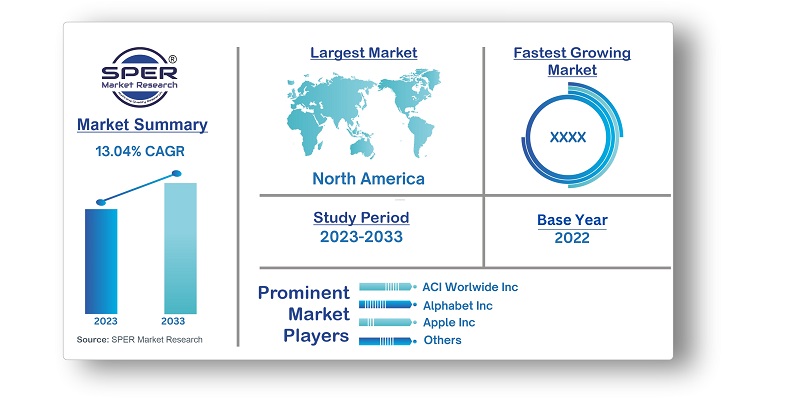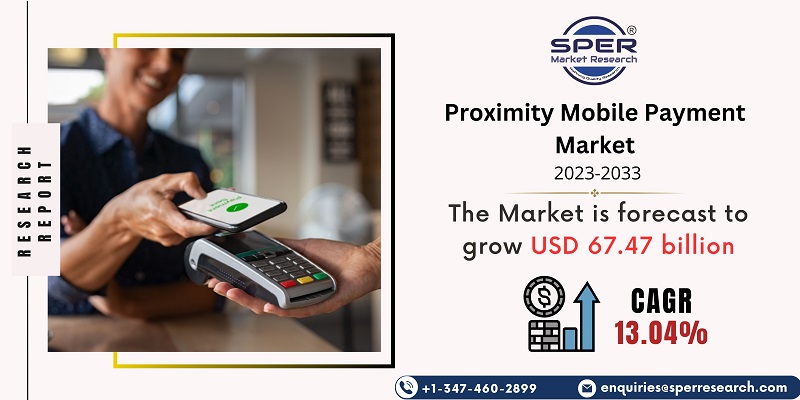
Proximity Mobile Payment Market Growth, Trends, Size, Revenue, Demand and Future Competition
Proximity Mobile Payment Market Size- By Product, By End User- Regional Outlook, Competitive Strategies and Segment Forecast to 2033
| Published: Sep-2023 | Report ID: IACT23154 | Pages: 1 - 234 | Formats*: |
| Category : Information & Communications Technology | |||
- In recent years, prominent companies in the proximity mobile payment market have implemented a variety of strategic initiatives, such as facility expansions and alliances. Apple Pay is the most popular proximity mobile payment service in the United States, accounting for almost half of all customers. Zelle has maintained its lead in peer-to-peer payments since 2021.


| Report Metric | Details |
| Market size available for years | 2019-2033 |
| Base year considered | 2022 |
| Forecast period | 2023-2033 |
| Segments covered | By Product, By End User |
| Regions covered | North America, Asia-Pacific, Latin America, Middle East & Africa and Europe. |
| Companies Covered | ACI Worlwide Inc, Alphabet Inc, Apple Inc, Mastercard Incorporated, Square Inc, Visa Inc, Others. |
- Consumers
- Small and Large Business
- Financial Institutions and Payment Processors
- Technology Providers
- Educational Institutions
| By Product: |
|
| By End User: |
|
- Global Proximity Mobile Payment Market Size (FY'2023-FY'2033)
- Overview of Global Proximity Mobile Payment Market
- Segmentation of Global Proximity Mobile Payment Market By Product (Barcodes, Near Field Communication)
- Segmentation of Global Proximity Mobile Payment Market By End User (Hospitality and Tourism, IT and Telecommunications, Aviation, Retail, Media and Entertainment, BFSI, Healthcare)
- Statistical Snap of Global Proximity Mobile Payment Market
- Expansion Analysis of Global Proximity Mobile Payment Market
- Problems and Obstacles in Global Proximity Mobile Payment Market
- Competitive Landscape in the Global Proximity Mobile Payment Market
- Impact of COVID-19 and Demonetization on Global Proximity Mobile Payment Market
- Details on Current Investment in Global Proximity Mobile Payment Market
- Competitive Analysis of Global Proximity Mobile Payment Market
- Prominent Players in the Global Proximity Mobile Payment Market
- SWOT Analysis of Global Proximity Mobile Payment Market
- Global Proximity Mobile Payment Market Future Outlook and Projections (FY'2023-FY'2033)
- Recommendations from Analyst
1.1. Scope of the report1.2. Market segment analysis
2.1. Research data source2.1.1. Secondary Data2.1.2. Primary Data2.1.3. SPER’s internal database2.1.4. Premium insight from KOL’s2.2. Market size estimation2.2.1. Top-down and Bottom-up approach2.3. Data triangulation
4.1. Driver, Restraint, Opportunity and Challenges analysis4.1.1. Drivers4.1.2. Restraints4.1.3. Opportunities4.1.4. Challenges4.2. COVID-19 Impacts of the Global Proximity Mobile Payment Market
5.1. SWOT Analysis5.1.1. Strengths5.1.2. Weaknesses5.1.3. Opportunities5.1.4. Threats5.2. PESTEL Analysis5.2.1. Political Landscape5.2.2. Economic Landscape5.2.3. Social Landscape5.2.4. Technological Landscape5.2.5. Environmental Landscape5.2.6. Legal Landscape5.3. PORTER’s Five Forces5.3.1. Bargaining power of suppliers5.3.2. Bargaining power of buyers5.3.3. Threat of Substitute5.3.4. Threat of new entrant5.3.5. Competitive rivalry5.4. Heat Map Analysis
6.1. Global Proximity Mobile Payment Market Manufacturing Base Distribution, Sales Area, Product Type6.2. Mergers & Acquisitions, Partnerships, Product Launch, and Collaboration in Global Promixity Mobile Payment Market
7.1. Global Proximity Mobile Payment Market Value Share and Forecast, By Product, 2023-20337.2. Barcodes7.3. Near Field Communication
8.1. Global Proximity Mobile Payment Market Value Share and Forecast, By End User, 2023-20338.2. Hospitality and Tourism8.3. IT and Telecommunications8.4. Aviation8.5. Retail8.6. Media and Entertainment8.7. BFSI8.8. Healthcare
9.1. Global Proximity Mobile Payment Market Size and Market Share
10.1. Global Proximity Mobile Payment Market Size and Market Share By Product (2019-2026)10.2. Global Proximity Mobile Payment Market Size and Market Share By Product (2027-2033)
11.1. Global Proximity Mobile Payment Market Size and Market Share By End User (2019-2026)11.2. Global Proximity Mobile Payment Market Size and Market Share By End User (2027-2033)
12.1. Global Proximity Mobile Payment Market Size and Market Share By Region (2019-2026)12.2. Global Proximity Mobile Payment Market Size and Market Share By Region (2027-2033)12.3. Asia-Pacific12.3.1. Australia12.3.2. China12.3.3. India12.3.4. Japan12.3.5. South Korea12.3.6. Rest of Asia-Pacific12.4. Europe12.4.1. France12.4.2. Germany12.4.3. Italy12.4.4. Spain12.4.5. United Kingdom12.4.6. Rest of Europe12.5. Middle East and Africa12.5.1. Kingdom of Saudi Arabia12.5.2. United Arab Emirates12.5.3. Rest of Middle East & Africa12.6. North America12.6.1. Canada12.6.2. Mexico12.6.3. United States12.7. Latin America12.7.1. Argentina12.7.2. Brazil12.7.3. Rest of Latin America
13.1. ACI Worldwide Inc.13.1.1. Company details13.1.2. Financial outlook13.1.3. Product summary13.1.4. Recent developments13.2. Alphabet, Inc.13.2.1. Company details13.2.2. Financial outlook13.2.3. Product summary13.2.4. Recent developments13.3. Apple Inc.13.3.1. Company details13.3.2. Financial outlook13.3.3. Product summary13.3.4. Recent developments13.4. Mastercard Incorporated13.4.1. Company details13.4.2. Financial outlook13.4.3. Product summary13.4.4. Recent developments13.5. Square Inc.13.5.1. Company details13.5.2. Financial outlook13.5.3. Product summary13.5.4. Recent development13.6. Visa Inc.13.6.1. Company details13.6.2. Financial outlook13.6.3. Product summary13.6.4. Recent development13.7. Others
SPER Market Research’s methodology uses great emphasis on primary research to ensure that the market intelligence insights are up to date, reliable and accurate. Primary interviews are done with players involved in each phase of a supply chain to analyze the market forecasting. The secondary research method is used to help you fully understand how the future markets and the spending patterns look likes.
The report is based on in-depth qualitative and quantitative analysis of the Product Market. The quantitative analysis involves the application of various projection and sampling techniques. The qualitative analysis involves primary interviews, surveys, and vendor briefings. The data gathered as a result of these processes are validated through experts opinion. Our research methodology entails an ideal mixture of primary and secondary initiatives.



Frequently Asked Questions About This Report
PLACE AN ORDER
Year End Discount
Sample Report
Pre-Purchase Inquiry
NEED CUSTOMIZATION?
Request CustomizationCALL OR EMAIL US
100% Secure Payment






Related Reports
Our Global Clients
Our data-driven insights have influenced the strategy of 200+ reputed companies across the globe.




















